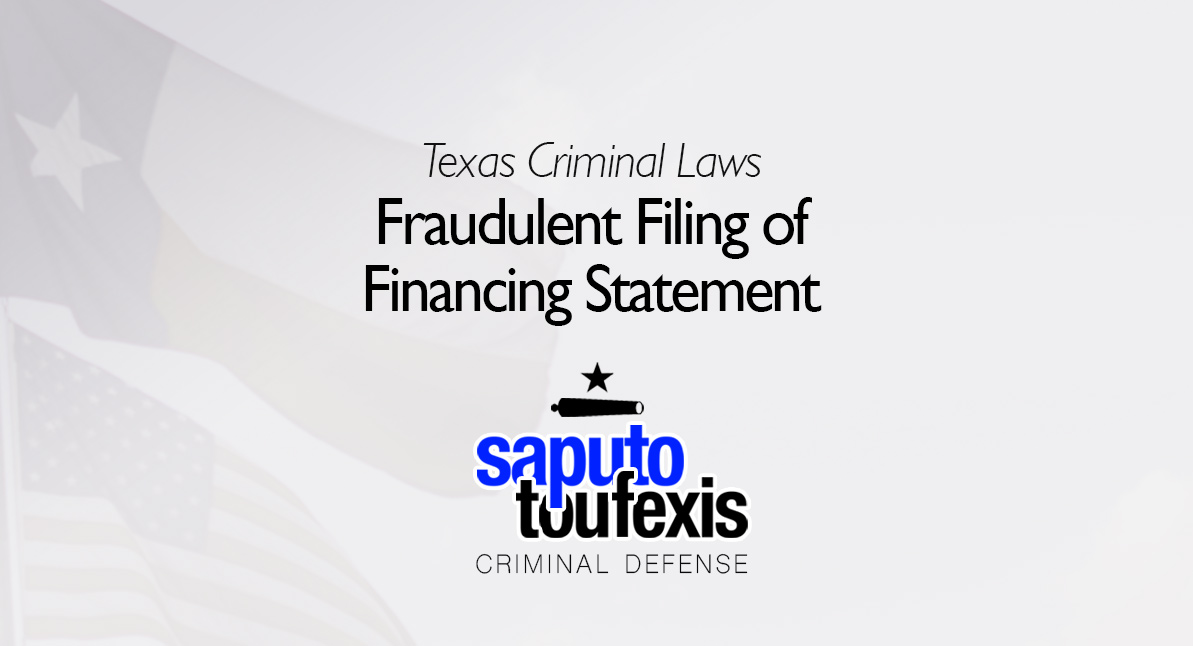The Texas Fraudulent Filing of Financing Statement law gives police the right to arrest you if they believe you presented a financial statement to be filed that was forged, contains a material false statement, or is groundless.
FAQs about the
Fraudulent Filing of Financing Statement law in Texas
- What is the current Texas law about Fraudulent Filing of Financing Statement?
- How can I be charged with a Fraudulent Filing of Financing Statement offense in Texas?
- What is the statute of limitation for Fraudulent Filing of Financing Statement in Texas?
- What is the penalty for a Texas Fraudulent Filing of Financing Statement offense?
- Can you get probation for Fraudulent Filing of Financing Statement in Texas?
- What level of crime is Fraudulent Filing of Financing Statement in Texas?
The Texas legislature codified this criminal offense in Texas Penal Code Section 37.101. The legislature did not update this law in 2023. In fact, this law has not been amended since 1997.
The Penal Code classifies the Texas Fraudulent Filing of Financing Statement law under Title 8 “Offenses Against Public Administration,” Chapter 37 “Perjury and Other Falsifications.” Learn more about the Texas offense of Fraudulent Filing of Financing Statement below.
What is the current Texas law about Fraudulent Filing of Financing Statement?
Texas law currently defines the offense of Fraudulent Filing of Financing Statement in Penal Code Section §37.101 as follows:[1]
(a) A person commits an offense if the person knowingly presents for filing or causes to be presented for filing a financing statement that the person knows:
(1) is forged;
(2) contains a material false statement; or
(3) is groundless.
How can I be charged with a Fraudulent Filing of Financing Statement offense in Texas?
You can be charged with Fraudulent Filing of Financing Statement in Texas if the state’s attorneys believe that each of the elements of 37.101(a) as described in the section above have been met.
What is the statute of limitation for Fraudulent Filing of Financing Statement in Texas?
Misdemeanor level Fraudulent Filing of Financing Statement charges have a two-year limitations period.[2] Felony level offenses have a three-year limitations period.[3]
What is the penalty for a Texas Fraudulent Filing of Financing Statement offense?
If the offense is prosecuted under subsection (a)(1), then a conviction Fraudulent Filing of Financing Statement conviction is punishable as a Third Degree Felony,[4] with a maximum possible fine under Texas state law of up to $10,000 and prison time from 2 to 10 years, unless the below enhancement applies.
If the offense is prosecuted under subsection (a)(1) and the state’s attorney prove that you have been previously convicted on two or more occasions of a violation of (a)(1), then the conviction can be enhanced to a Felony of the Second Degree,[5] with a maximum possible fine under Texas state law of up to $10,000 and prison time from 2 to 20 years.
If the offense is prosecuted under subsection (a)(2) or (a)(3), then it is punished as a Class A misdemeanor,[6] with a maximum possible fine under Texas state law of up to $4,000 and jail time of up to one year, unless the state’s attorneys prove that you had the intent to defraud or harm someone, in which case it is punished as a state jail misdemeanor.[7]
Can you get probation for Fraudulent Filing of Financing Statement in Texas?
The Texas Code of Criminal Procedure allows both judges and juries to grant probation for Fraudulent Filing of Financing Statement, and judges are also allowed to accept deferred adjudication plea deals.[8]
Note, however, that no matter the offense, neither judges nor juries may recommend community supervision for any suspended sentence of over 10 years.[9] Also, judges may not grant community supervision after a conviction if (1) the defendant used or exhibited a deadly weapon during the commission of the felony or immediate flight thereafter and (2) the defendant used or exhibited the deadly weapon himself or was a party to the offense and knew that a deadly weapon would be used or exhibited.[10]
What level of crime is Fraudulent Filing of Financing Statement in Texas?
The Penal Code classifies Fraudulent Filing of Financing Statement as a Class A misdemeanor, state jail felony, second degree felony, or third degree felony, depending on the circumstances.
Learn more about the penalty range for this offense in the section above.
Legal References:
^1. Texas Penal Code §37.101. This law is current as of 2024.^2. Code of Criminal Procedure 12.02(a)^3. See Code of Criminal Procedure 12.01(9)^4. Texas Penal Code §37.101(b)^5. Texas Penal Code §37.101(b)^6. Texas Penal Code §37.101(b)^7. Texas Penal Code §37.101(b)^8. See Chapter 42, Texas Code of Criminal Procedure, Art. 42A.054, Art. 42A.056, Art. 42A.102^9. Art. 42A.053(c), Texas Code of Criminal Procedure^10. Art. 42A.054(b), Texas Code of Criminal Procedure










